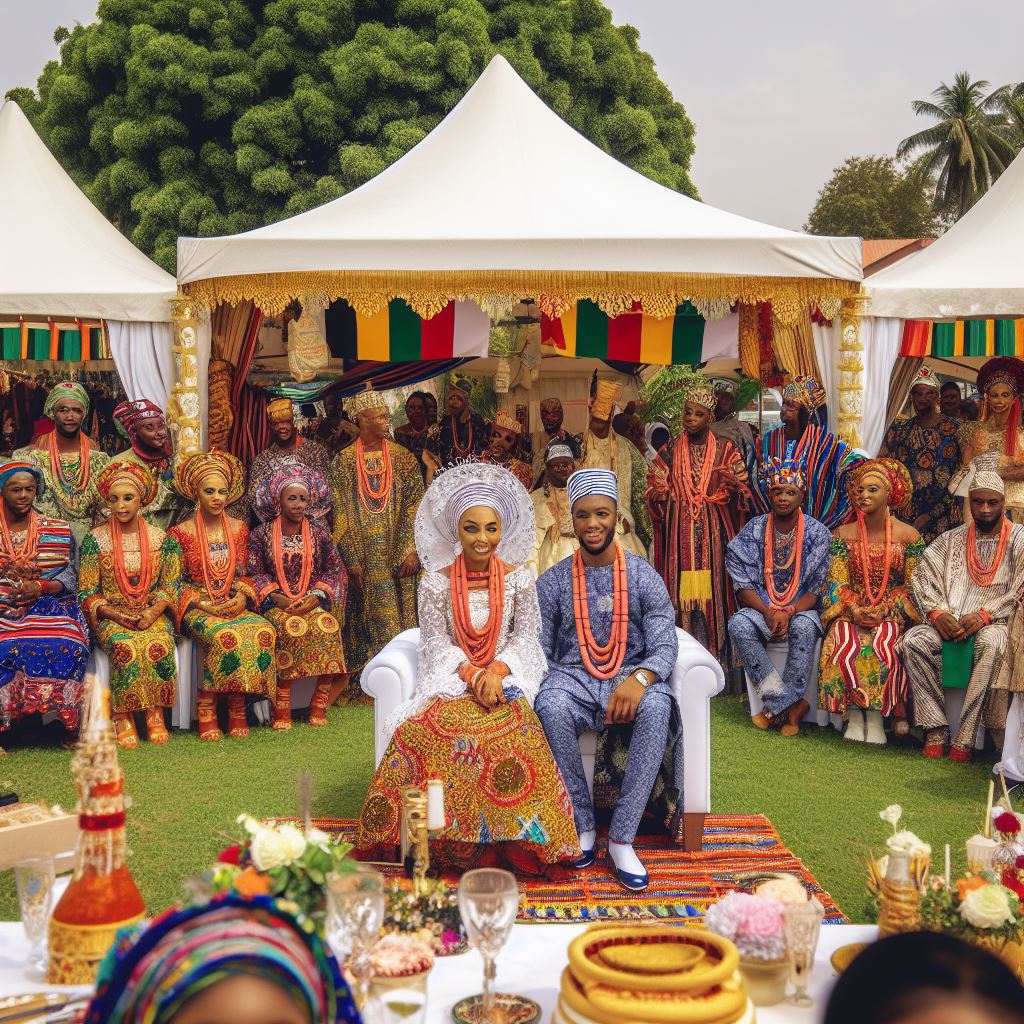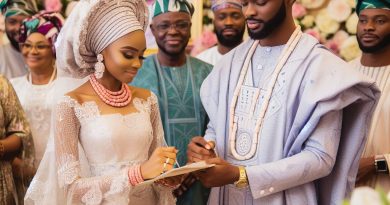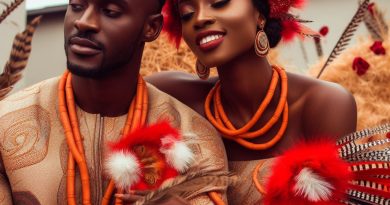Nigerian Engagement Lists: What To Expect and Prepare
Last Updated on January 29, 2024
Introduction
Brief explanation of Nigerian engagement lists
- Nigerian engagement lists are a crucial part of the traditional Nigerian wedding ceremony, also known as the introduction or engagement ceremony. These lists consist of gift items requested by the bride’s family.
- Nigerian Engagement Lists represent a significant cultural facet, embodying the essence of Nigerian marriage traditions.
- Rooted in history, these lists symbolize the union of two families, transcending mere exchanges of gifts.
- Understanding these lists and the sentiments they carry is essential when entering the world of Nigerian weddings.
Importance of understanding and preparing for Nigerian engagement lists
- Understanding and preparing for Nigerian engagement lists is important to ensure a successful and smooth wedding process. It helps to avoid misunderstandings and potential conflicts between both families.
- Preparation is key to respecting and embracing these cultural traditions. Nigerian engagement lists are both symbolic and practical, connecting past and present, tradition and modernity.
- To appreciate the depth of this practice, one must delve into its details, intricacies, and regional variations.
- This blog section will guide you through these important aspects, allowing you to partake in the joyous celebration of the engagement process within Nigerian weddings.
Read: The Role of Aso Ebi in Nigerian Wedding Functions
Overview of Nigerian Engagement Lists
Meaning and significance of engagement lists in Nigerian culture
Engagement lists hold great importance in Nigerian weddings as they symbolize the formal agreement of marriage between families.
These lists serve as a tangible representation of the groom’s family’s commitment and seriousness towards the union.
Traditional and cultural motives behind Nigerian engagement lists
Nigerian engagement lists are rooted in deep cultural significance. They are meant to showcase the groom’s ability to provide for his bride and offer an assurance of financial security.
These lists also act as a way for the bride’s family to assess the groom’s commitment to their daughter.
Types of items usually found in Nigerian engagement lists
- Dowry: The bride’s family often requests dowry items, which may include livestock, cash, or other valuable assets. This tradition reflects the idea of the groom’s family contributing to the bride’s well-being.
- Clothing and Accessories: Traditional attire, such as Asoebi fabrics or gele (headgear), are often included in engagement lists. These items serve as a way to showcase the couple’s cultural heritage during wedding festivities.
- Food and Drinks: Nigerian engagement lists may include provisions for the wedding ceremony, such as assorted drinks, food items, and cooking utensils. These items symbolize the groom’s family’s willingness to support the couple’s future household.
- Household Items: The inclusion of household items like furniture, electronics, or kitchen appliances signifies the groom’s readiness to provide a comfortable home for his bride.
- Jewelry: Ornate jewelry, such as gold necklaces, earrings, bracelets, or wristwatches, are often requested as a symbol of the bride’s beauty and the groom’s desire to adorn her.
- Education and Career: Some engagement lists may also include requests for educational support or assistance with the bride’s career development. This highlights the groom’s commitment to his bride’s personal growth and overall success.
- Miscellaneous Items: Additionally, engagement lists may include miscellaneous requests like blankets, beddings, or even toiletries. These items depict the groom’s family’s attention to detail and their desire to provide for the bride’s every need.
In essence, Nigerian engagement lists play a vital role in traditional weddings, reflecting cultural values and family expectations.
These lists showcase the groom’s commitment to the bride, his ability to provide, and his willingness to support their future together.
Understanding the meaning, motives, and items commonly found in Nigerian engagement lists is crucial for anyone preparing for this significant cultural event.
Read: Modern Twists to Traditional Nigerian Marriage Functions
What to Expect on Nigerian Engagement Lists
Different expectations depending on ethnic groups and regions
When it comes to Nigerian engagement lists, the expectations can vary depending on the ethnic groups and regions involved.
While there may be similarities, each group has its own customs and traditions that influence what is included on their engagement lists.
Common items included on engagement lists
- Common items found on engagement lists include traditional attire and accessories. These are important for the couple as they prepare for their engagement ceremony, which is often a display of cultural richness.
- Another common item that is expected on engagement lists is cash and gifts for the parents and extended family of the bride. This serves as a show of gratitude and respect for the bride’s family and support for the start of the couple’s new life together.
- Household items and appliances are also commonly included on engagement lists. These items help the couple establish their new home and are often practical gifts that will be used on a daily basis.
- In some cases, engagement lists may also include livestock and agricultural products. This highlights the importance of agriculture in certain communities and serves as a way to contribute to the couple’s future stability and well-being.
- Additionally, there may be customary items specific to certain tribes that appear on engagement lists. These items hold cultural significance and reflect the traditions and values of the tribe to which the couple belongs.
Unusual or unique items that may appear on engagement lists
- While there are common items found on most engagement lists, there are also unusual or unique items that may appear.
- These items can vary greatly and often reflect the personal preferences and tastes of the couple and their families.
- For instance, some engagement lists may include expensive jewelry or luxury goods. Others may feature specific items that hold sentimental value to the couple, such as family heirlooms or items of cultural significance.
- It’s important to note that the inclusion of specific items on an engagement list does not necessarily mean they must be provided by the groom’s family.
- The list serves as a guide, and negotiations often take place to determine what can be provided based on the families’ financial capabilities.
Generally, Nigerian engagement lists can differ based on ethnic groups and regions. While there are common items such as traditional attire, cash, and household items, there can also be unique and unexpected items included.
Ultimately, engagement lists serve as a cultural expression and a way to support the couple as they embark on their journey together.
Read: Hausa Wedding: A Blend of Culture and Modernity

Delve into the Subject: From Pre-Wedding to Post-Honeymoon: Books for Every Stage
Preparing for Nigerian Engagement Lists
Communicating with the partner’s family for guidance
In Nigerian culture, an engagement is not just a union between two individuals, but also a joining of families. To ensure a successful engagement, it is vital to establish clear communication with the partner’s family.
This allows for guidance and understanding of their expectations and traditions.
Setting a budget and determining affordability
Engagements can be costly affairs, but it is important to set a budget and determine what you can afford.
Discuss financial expectations with both families and find a balance that works for everyone. This will help prevent any potential conflicts or misunderstandings later on.
Researching cultural norms and expectations
Each culture has its own set of norms and expectations for engagements. To ensure that everything goes smoothly, it is crucial to research and understand Nigerian cultural norms.
This includes understanding traditional customs, preferred attire, and any other unique expectations for the event.
Seeking advice from experienced individuals or wedding planners
Engagements are significant events, and seeking guidance from experienced individuals or wedding planners can be invaluable.
They can provide expert advice on etiquette, traditions, and practical tips that can make the engagement planning process easier and more enjoyable.
Shopping and gathering items gradually to reduce financial burden
Engagement lists often include a variety of items, both big and small. To avoid overwhelming expenses, it is prudent to start shopping and gathering items gradually.
This allows for a gradual financial burden and prevents last-minute rushes and unnecessary stress.
Creating a checklist to keep track of items acquired and still needed
To stay organized and ensure that everything is accounted for, create a checklist. This list will help keep track of items already acquired and those still needed.
It is a practical tool that ensures nothing is forgotten or overlooked during the engagement planning process.
Overall, preparing for Nigerian engagement lists requires effective communication with the partner’s family, setting a budget, researching cultural norms, seeking advice, shopping gradually, and creating a checklist.
By following these steps, individuals can ensure a successful and culturally appropriate engagement.
Read: Cultural vs. Biblical Views: Keeping the Marital Bed Pure in Nigeria
Conclusion
Recap of the importance of understanding and preparing for Nigerian engagement lists
Delving into the intricacies of Nigerian engagement lists is vital for anyone planning to embrace the rich cultural heritage and traditions of Nigerian weddings.
Being prepared and knowledgeable about the items, customs, and expectations can significantly contribute to the smooth and joyful celebration of this significant event in Nigerian marital traditions.
Encouragement for respecting and embracing cultural traditions
Respecting and embracing these cultural traditions is not only a sign of appreciation but also a way to strengthen bonds with family, friends, and the community.
It fosters unity and solidarity, reinforcing the importance of cultural values and heritage in Nigerian society.
Emphasis on the joy and celebration of the engagement process in Nigerian weddings
The engagement process in Nigerian weddings is a time of great joy, celebration, and cultural richness. It is a time when families come together to bless the union, and the couple is surrounded by the love and support of their community.
Embracing this process is not just about fulfilling customs; it’s about rejoicing in the beauty of Nigerian culture and traditions.


